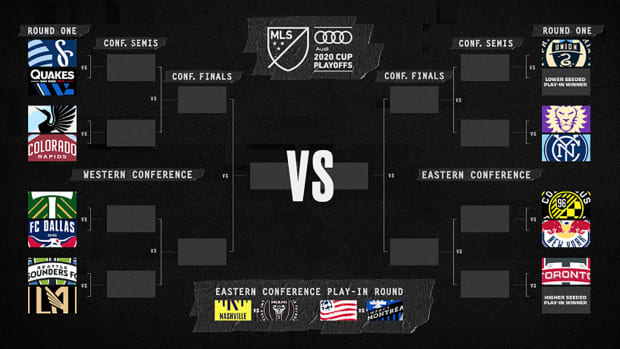The playoffs kick off under a coronavirus cloud, with guidelines in play for forfeits and positive tests altering fortunes.
It’s a fact of MLS life that the playoffs often don’t reflect much of what happened in the regular season. Across the past 10 years, for example, just two first-place conference finishers have advanced to the MLS Cup final—that’s two out of 20 possible berths. More five seeds have contested the championship during that span than one seeds.
The playoffs are their own, unique animal, disconnected from the bulk of the MLS regular season narrative. Often that’s bewildering. This year, however, it would be a blessing. Because the challenges and relative chaos that burdened the 2020 regular season, from the pandemic pause to the postponements, cancellation and skin-of-their-teeth scheduling this fall, would wreak havoc on the road to MLS Cup. The league has almost no wiggle room or margin for error. A coronavirus outbreak in the wrong place at the wrong time could wreck the tournament’s competitive integrity or, perhaps, even leave the league without a 2020 champion.
MLS will have to hold its collective breath (figuratively and maybe a bit literally) and hope this year’s playoffs, which begin Friday with two Eastern Conference preliminary round games, don’t resemble the regular season. It has 17 matches to pull off in three weeks, with the trophy lift and confetti dump supposed to happen on Dec. 12.

If the 18 playoff qualifiers can pull this off, MLS will become the first American pro sports league to stage and complete a playoff season in its home markets. The NHL, NBA, MLB, WNBA and Major League Lacrosse crowned champions inside a bubble. The NWSL, AHL, ECHL, NLL, MASL and NBA G League canceled their postseasons. Only the USL gave it an honest shot, and it fell agonizingly at the final hurdle. Both the third-tier League One final and second-tier USL Championship final were canceled because of an outbreak among the teams from Omaha and Tampa Bay, respectively.
But MLS believes it can do it. It returned to home markets in late August and since then has given no indication it was reconsidering re-entering a bubble come playoff time.
“I think that there are advantages and disadvantages to the bubble. I think that it becomes effective once you get established, but it's also disruptive in people's lives,” league president Mark Abbott told ESPN last month.
It’s also prohibitively expensive.
So, with same-day charters and strict protocols in place, the season continued—except when it didn’t. The ultimate target was 23 games per team. Eighteen of 26 teams made it all the way (the Colorado Rapids played the fewest with 18). The 2020 campaign became as much a test of outbreak avoidance as a test of soccer skill. And even when a team, its staff and players have everything on the line, sometimes avoiding infection is possible. Just look at what happened to Omaha, Tampa Bay and Inter Miami, the MLS expansion club that enters Friday’s playoff game against Nashville SC minus Gonzalo Higuaîn, Leandro González Pirez and Federico Higuaín, among others, according to the Miami Herald.
Los Angeles FC, last year’s Supporters’ Shield winner, is another club that’s already been hit hard. Any hopes of recapturing their 2019 form for a playoff run were probably ended by the FIFA break, as leading scorer Diego Rossi, assist leader Brian Rodríguez, midfielder José Cifuentes and defender Diego Palacios all tested positive while on international duty. They’ll miss next Tuesday’s playoff opener against the champion Seattle Sounders.

MLS paid for long-haul charter flights to return players from their national teams, but even that wasn’t enough to stem the coronavirus tide.
So that’s two clubs, and two games, now heavily impacted before the playoffs even kick off. So far, it’s a competitive integrity issue and not an existential one. At this point, the matches will be played. But what are the odds they’ll get through all 17?
According to ESPN, of the 130 regular season games scheduled since Sept. 25, 12 were either postponed or canceled. That’s about one out of every 11 matches. During the regular season, there was some time to shift the schedule around or, lacking that, the option of using points per game to determine standing. That doesn’t exist now. A playoff game can be pushed back a day or two, at most. And there’s a domino effect, with each round connected to the next. One out of 11, or even an improvement on that rate, almost guarantees there’s a disruption between now and MLS Cup.
MLS has announced a partial plan to limit the impact of an outbreak to a single game. It’s harsh but probably necessary. Avoiding an outbreak is now part of the recipe for MLS Cup hopefuls.
“In cases where the league has determined that a club is unable to play on the scheduled playoff round date and the league has determined that the match cannot be rescheduled, the club will forfeit the match and their opponent will advance,” MLS wrote in the playoff guidelines distributed around the league.
“In cases where the league has determined that both clubs are unable to play on the scheduled playoff round date and the league has determined that the match cannot be rescheduled, the club with the higher points per game earned through the MLS regular season will advance.”
That plan will work through the two conference finals, which are scheduled for Dec. 6. When asked to clarify the virus’s potential impact on the MLS Cup final, the league said it had every intent to stage a game to crown a champion, though that does not address numerous questions and potential problems.

Is there any possibility the final could be pushed back from Dec. 12? The league would miss out on its prime time Fox TV window, but isn’t that better than not having a 2020 champion? To battle through everything the league has endured all year long only to finish without a resolution seems, at least superficially, like an agonizing non-starter, and the league did indicate to Sports Illustrated that it would entertain postponing the final in the event of a health and safety issue. The Dec. 16 relaunch of the Concacaf Champions League might play a role in any decision with three MLS playoff teams involved.
What if time to reschedule the final runs out? Would the champion be decided by forfeit? Would there be a trophy lift over Zoom? Or would the desire to stage a game, any game, lead MLS to invite a beaten conference finalist to replace the stricken team? Any of those potential outcomes produces an asterisk that would follow a champion around in perpetuity.
MLS theoretically has a week or two to come up with answer to these questions, but the data suggests there’s a non-zero chance those hypotheticals could become reality. In a best-case scenario, MLS already was guaranteed to crown a champion like no other. There are three teams with losing records in the playoffs. There are no fans, limiting the supposed reward of home-field advantage. Toronto FC and the Montreal Impact are playing their home games in Connecticut and New Jersey, respectively. The international break appears to have wrecked at least one club’s chances. Now there’s the possibility of playoff forfeits.
The MLS Cup playoffs have always been about unpredictability and chaos between the white lines. Over the next three weeks, for the sake of this unique season’s competitive credibility, MLS will have to hope that chaos remains there.